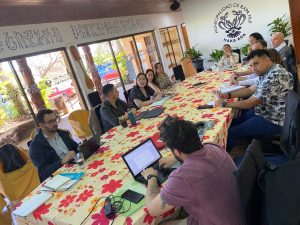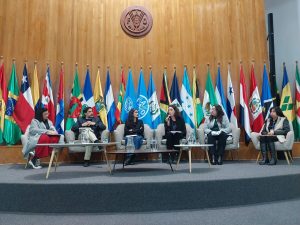An intense week of work included meetings and workshops with local stakeholders to review and complement a preliminary ten-year investment...
Rimisp participates in IV Decentralization 2025 Congress in Chile
Rimisp researchers Carolina Olcay and Natalia Slachevsky prepared the presentation comparing case studies in Chile, Ecuador and Peru.

The IV Decentralization 2025 Congress, which took place from August 20-21 in La Serena, Chile, was organized by the Undersecretary of Regional and Administrative Development (SUBDERE) and included discussions and panels on productive reconversion, climate change, territorial innovation and subnational financing, with specialists from Mexico, Panama, Peru, Belgium and the Basque Country.
Carolina Olcay and Natalia Slachevsky, researchers at Rimisp – Latin American Center for Rural Development, prepared the presentation for the panel entitled: Productive Reconversion and Just Transitions. During the presentation, three different models of territorial governance for productive development in Chile, Ecuador and Peru were compared. “What I am presenting to you today is based on our experience in different projects that we have carried out in Latin America (…) different case studies that we have developed during the last three years.” Slachevsky emphasized during the presentation.
In detailing each of the countries, Rimisp’s principal researcher noted that while in Chile, Peru and Ecuador political power “is concentrated in the central government, they have quite heterogeneous decentralization processes and different institutions in charge of fostering development”.
Ecuador is characterized by a decentralized governance model for productive development. The productive model is housed in the prefectures, and they work very strongly with the Consortium of Autonomous Provincial Governments of Ecuador (CONGOPE). In Peru, since 2017, the Regional Development Agencies (ARD) have been promoted, which are a multi-stakeholder model with actors of different types: private, public, civil society and academia. In the case of Chile, Slachevsky highlighted. “some strengths that caught the attention of government officials from Peru and Ecuador, was the stability of institutions such as CORFO, Sercotec, INDAP and FIA that have a wide and stable offer of services and development programs. Among the gaps is the high centralization of decisions and resources and technical capacities in the Regional Governments (GOREs)”.
AUTHORITIES, ACADEMICS AND INTERNATIONAL EXPERTS
Some of the authorities present at the inauguration were the Governor of Coquimbo, Cristóbal Juliá; the Undersecretary for Regional Development (SUBDERE), Francisca Perales; the rector of the University of La Serena, Luperfina Rojas; and the president of the Association of Regional Governors (Agorechi) and Governor of O’Higgins, Pablo Silva.
The congress was also attended by specialists of various nationalities, including Gabriela Delgado (Mexico), Fernando Márquez (Basque Government in Chile), Roxana Méndez (Panama), Francisco Javier Aguilar García (Mexico), Martine Dirven (Belgium), Margarita Flores (Mexico), among others.
News
Country News
Rimisp participates in IV Decentralization 2025 Congress in Chile
Rimisp researchers Carolina Olcay and Natalia Slachevsky prepared the presentation comparing case studies in Chile, Ecuador and Peru.
In order to transform the territories, communities must be listened to
Rimisp presented at an international seminar celebrating 10 years of the "Small Localities" program in Chile.
Subscribe
Our offices:

- Chile: Huelén 10, Providencia, Santiago, Metropolitan Region (+56-2) 2236 4557 | Fax (+56-2) 2236 4558.

- Ecuador: Czechoslovakia E9-95 between Switzerland and Moscow. Eveliza Plaza Building. Ground Floor. Quito. (+593-2) 5150144.

- Colombia: Carrera 9 No 72-61 Office 303. Bogotá. (+57-1) 2073 850.



